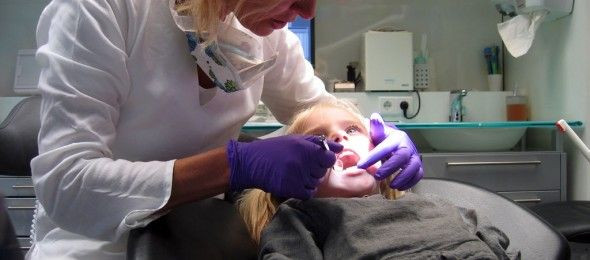Beware Of Predatory Healthcare Financing: Patients Buried In Bills From Medical Credit Cards, Loans With High Interest Rates

Receiving dentures can cost several thousand dollars, a hefty price for an elderly person living off of social security. Medical credit cards, which are meant to solve the problem by providing patients with other payment options, often lead to debt accumulation from high interest and late penalty fees.
Medical credit cards are offered to patients, many of whom are elderly, during a vulnerable time — when they're told they need a treatment they can’t afford. If a patient can’t pay upfront, healthcare providers work with credit card and lending companies like iCare Financial to offer a seemingly quick and easy solution: setting up lines of credit or starting a medical credit card to pay for the work.
It’s a practice that occurs in areas of healthcare that aren’t usually covered by insurance, such as dental care and devices like hearing aids. But more and more patients are finding that the quick solution could lead to a quagmire of debt later on, due to interest rates and penalty fees that begin to rack up. The practice has led to a number of lawsuits against medical providers, where patients claim they were not properly informed about the pitfalls of opening a line of credit.
“One missed payment can really ruin a patient’s life,” Cameron P. Kmet, a chiropractor practicing in Alaska, told The New York Times.
When the economy worsened, business for medical credit card companies improved, as more and more patients struggled to pay exorbitant medical expenses upfront. Overall, the use of credit cards in the healthcare system has boomed. Americans charged nearly $45 billion in medical costs to credit cards in 2010, according to McKinsey & Company. The industry for medical care cards in particular, however, has grown due to the fact that people search for services that aren’t covered by Medicare, such as dental care. The New York Times reports that attorneys general in various states have sued medical professionals for misleading patients about the financial terms of medical cards, and for overcharging, often billing patients for “unauthorized work.”
“Doctors, dentists and others have a financial incentive to recommend the financing because it encourages patients to opt for procedures and products that they might otherwise forgo because they are not covered by insurance,” Jessica Silver-Greenberg writes for The New York Times.
Harold Koi-Than, 82, did not realize he had opened a CareCredit card during a dental visit, and was later surprised to find that he was missing payments when a company representative called his home. Another dental patient at Aspen Dental Management, 74-year-old Carl Dorsey, was told to take out a medical credit card to help pay for his $2,634 dentures, but was later pursued by debt collectors because he couldn't keep up with his credit payments on his $800 a month paycheck. “This whole ordeal has been devastating,” Dorsey told The New York Times.
However, not all medical providers agree with the practice of credit lines. “[S]ome practitioners refuse to use [credit cards], saying they threaten to exploit the traditional relationship between provider and patient,” Silver-Greenberg of The New York Times writes.
Others bring up ethical concerns with the practice. Dr. Paul A Hattis, senior associate director of the Master’s of Public Health program at Tufts University Medical School, wrote a letter to the New York Times in response to their article: “How do I explain to the medical students whom I teach that reaching into your own wallet to help a poor patient afford a needed medicine may be viewed as unethical, while creating possible dire financial consequences for someone you treat so that you can collect your full fees is no cause for concern?” he wrote. He was referring to an article published in the Journal of the American Medical Association, in which a physician tried to get a patient’s insurance to cover her medication refill, but ended up giving her $30 from his own pocket. This physician was later reprimanded by clinic directors for “unprofessional boundary-crossing behavior.”
Other responses to the article, however, included a dentist who says his patients are familiar with the concept of no-interest loans. Medical credit cards have “allowed thousands of patients to have mouths restored to excellent oral health, also improving their general health and appearance,” Dr. Steven J. Shuster writes.
Published by Medicaldaily.com



























